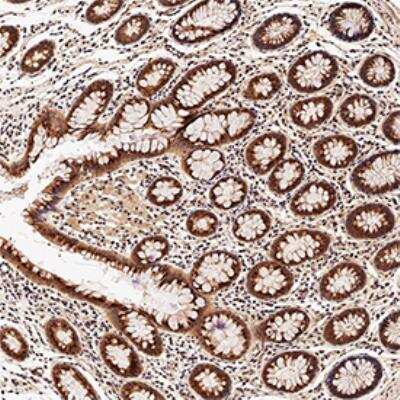Caspase-9 [p Ser196] Antibody
Novus Biologicals, part of Bio-Techne | Catalog # NB100-56122

Key Product Details
Validated by
Biological Validation
Species Reactivity
Human
Applications
Immunohistochemistry, Immunohistochemistry-Paraffin, Immunoprecipitation, Western Blot
Label
Unconjugated
Antibody Source
Polyclonal Rabbit IgG
Concentration
This product is unpurified. The exact concentration of antibody is not quantifiable.
Product Specifications
Immunogen
A synthetic phosphopeptide corresponding to amino acids 188-206 (EKLRRRFSS*LHFMVEVKGD) of human caspase-9 was used as immunogen; GenBank no. gi|27802691|gb|AAO21133.1|. S* refers to phosphorylated serine.
Modification
p Ser196
Clonality
Polyclonal
Host
Rabbit
Isotype
IgG
Scientific Data Images for Caspase-9 [p Ser196] Antibody
Immunohistochemistry-Paraffin: Caspase-9 [p Ser196] Antibody - Unpurified [NB100-56122] - Caspase-9 [p Ser196] Antibody [NB100-56122] - Human colon cancer using Caspase-9 antibody at 1:500 on a Bond Rx autostainer (Leica Biosystems). The assay involved 20 minutes of heat induced antigen retrieval (HIER) using 10mM sodium citrate buffer (pH 6.0) and endogenous peroxidase quenching with peroxide block. The sections were incubated with primary antibody for 30 minutes and Bond Polymer Refine Detection (Leica Biosystems) with DAB was used for signal development followed by counterstaining with hematoxylin. Whole slide scanning and capturing of representative images was performed using Aperio AT2 (Leica Biosystems). Cytoplasmic staining of Caspase 9 was observed. Staining was performed by Histowiz.
Applications for Caspase-9 [p Ser196] Antibody
Application
Recommended Usage
Immunohistochemistry
1:200 - 1:500
Immunohistochemistry-Paraffin
1:200 - 1:500
Immunoprecipitation
1:50-1:200
Western Blot
1:1000-1:2000
Formulation, Preparation, and Storage
Purification
Unpurified
Formulation
Whole antisera
Preservative
0.05% Sodium Azide
Concentration
This product is unpurified. The exact concentration of antibody is not quantifiable.
Shipping
The product is shipped with polar packs. Upon receipt, store it immediately at the temperature recommended below.
Stability & Storage
Store at 4C short term. Aliquot and store at -20C long term. Avoid freeze-thaw cycles.
Background: Caspase-9
Additional Caspase-9 Products
Product Documents for Caspase-9 [p Ser196] Antibody
Product Specific Notices for Caspase-9 [p Ser196] Antibody
This product is for research use only and is not approved for use in humans or in clinical diagnosis. Primary Antibodies are guaranteed for 1 year from date of receipt.
Loading...
Loading...
Loading...
Loading...
Loading...

![Western Blot: Caspase-9 [p Ser196] Antibody [NB100-56122] Western Blot: Caspase-9 [p Ser196] Antibody [NB100-56122]](https://resources.bio-techne.com/images/products/Caspase-9-[p-Ser196]-Antibody-Western-Blot-NB100-56122-img0004.jpg)